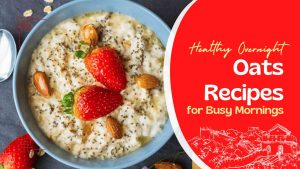Originally posted on December 12, 2023 @ 6:43 pm
Breakfast is the most important meal of the day, and that goes for our furry friends too! Providing a nutritious breakfast for your dogs sets them up for a day of energy and vitality. But what can dogs eat for breakfast? Let’s explore some healthy breakfast ideas that will make their tails wag with delight!
Contents
- 1 Leftovers for Breakfast – A Convenient Option
- 2 Eggs – A Delicious and Nutritious Breakfast Choice
- 3 Sardines – A Healthy Source of Omega-3s
- 4 Cereals – A Wholesome Option for Breakfast
- 5 Chicken Wings or Necks – Quick and Easy Breakfast Meal
- 6 Milk – A Small Bowl of Goodness
- 7 Sharing Your Healthy Breakfast – A Bonding Experience
- 8 Conclusion
- 9 FAQ
- 9.1 What kind of breakfast can I give my dog?
- 9.2 Can I give my dog leftovers for breakfast?
- 9.3 Are eggs a good choice for dogs’ breakfast?
- 9.4 Can I feed sardines to my dog for breakfast?
- 9.5 Can dogs eat cereals for breakfast?
- 9.6 Are chicken wings or necks suitable for dogs’ breakfast?
- 9.7 Can I give milk to my dog for breakfast?
- 9.8 Can I share my own breakfast with my dog?
- 9.9 What is the importance of a balanced and varied breakfast for dogs?
- 10 Source Links
Key Takeaways:
- Proteins like chicken, beef, and eggs are a great addition to dogs’ breakfast.
- Sardines provide omega-3 fatty acids for their overall health.
- Cooked cereals like rolled oats with milk or yogurt offer a wholesome option.
- Chicken wings or necks can be a quick and easy breakfast meal.
- A small bowl of milk can be part of their breakfast ritual.
Leftovers for Breakfast – A Convenient Option
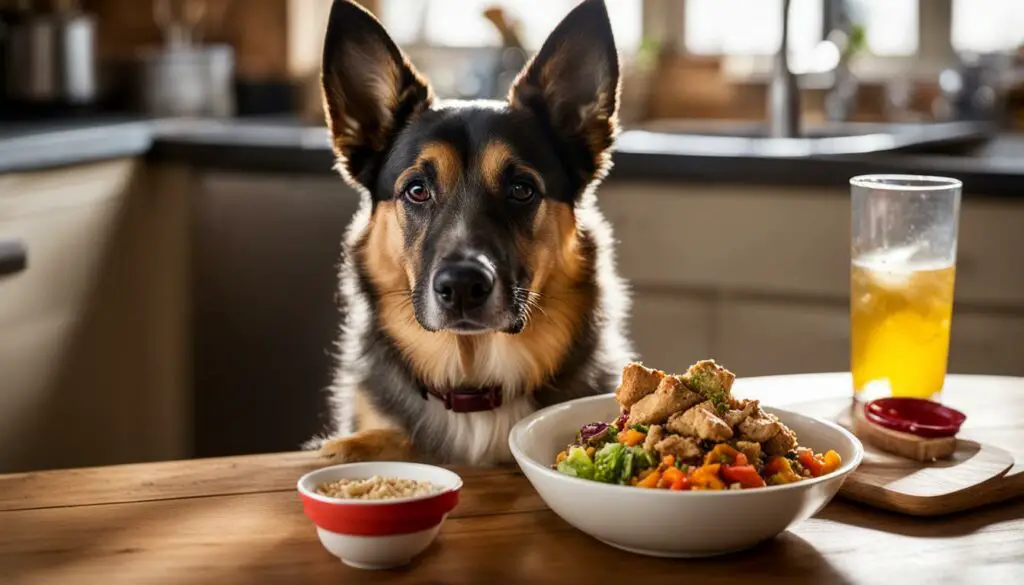
Looking for a convenient and dog-friendly breakfast idea? Leftovers are the answer! Whether it’s cold chicken, beef, lamb, or even that occasional spaghetti dish, you can give your furry friend a tasty and satisfying meal with minimal effort.
Leftovers are not only convenient for busy pet parents, but they also provide a great way to reduce food waste while giving your dog a variety of flavors to enjoy. Just make sure to double-check that the leftovers are safe and suitable for your pup to consume. Avoid using ingredients that are toxic to dogs, such as onions, garlic, and certain spices.
When offering leftovers to your dog, it’s essential to pay attention to portion sizes. Ensure that the amount you give them is appropriate for their size, age, and activity level. If you’re unsure, consult your veterinarian for guidance.
For additional safety, always serve leftovers at room temperature. Avoid feeding directly from the fridge or reheating in the microwave, as extreme temperatures can upset your dog’s digestive system. If necessary, you can warm the leftovers gently in a pan or use a food warmer.
Remember, the key is to provide a balanced and nutritious meal for your dog, even when using leftovers. Supplement their breakfast with a source of lean protein, carbohydrates, and healthy fats. Consider adding some fresh vegetables or fruits as well for added vitamins and minerals.
Be creative with your dog’s breakfast and surprise them with a variety of tasty leftovers. They’ll be thrilled with the flavorful meal, and you’ll feel good about reducing food waste and providing a satisfying start to their day.
So, the next time you find yourself wondering what to do with those extra food portions, don’t forget about your furry friend. They’ll appreciate the dog-friendly breakfast ideas you can create using leftovers!
Eggs – A Delicious and Nutritious Breakfast Choice

Eggs are a favorite breakfast choice for dogs. They can be fried sunny side up, scrambled with a bit of parmesan cheese, or hard-boiled. Eggs provide a good source of protein and can be easily cooked in advance for a quick and nutritious addition to their breakfast.
Scrambled eggs for dogs are a simple and tasty option. You can add a sprinkle of parmesan cheese for added flavor. The aroma of fluffy scrambled eggs will surely make their tails wag!
If you prefer a different cooking method, fried sunny side up eggs are another great choice. The runny yolk adds a delicious touch to their breakfast. Just make sure not to cook the eggs with any added oils or seasonings.
Hard-boiled eggs for dogs are a quick and convenient option. They can be made in advance and stored in the refrigerator for a few days. Hard-boiled eggs are also a great portable snack for outings or as training treats.
Remember, eggs should always be cooked thoroughly to eliminate the risk of bacterial contamination. Avoid using any seasonings or additives that might be harmful to dogs. Stick to plain and simple eggs to ensure their safety and well-being.
Eggs are not only delicious but also packed with essential nutrients. They are a good source of high-quality protein, which helps support your dog’s muscle development and repair. Eggs also provide important vitamins such as vitamin A, vitamin D, and various B vitamins.
It’s worth noting that most dogs can tolerate eggs without any issues. However, some dogs may have sensitivities or allergies, so it’s always a good idea to introduce eggs gradually into their diet and observe any adverse reactions.
Overall, including eggs in your dog’s breakfast is a healthy and enjoyable choice. Whether scrambled, fried, or hard-boiled, they offer a nutritious boost to start their day off right.
Sardines – A Healthy Source of Omega-3s
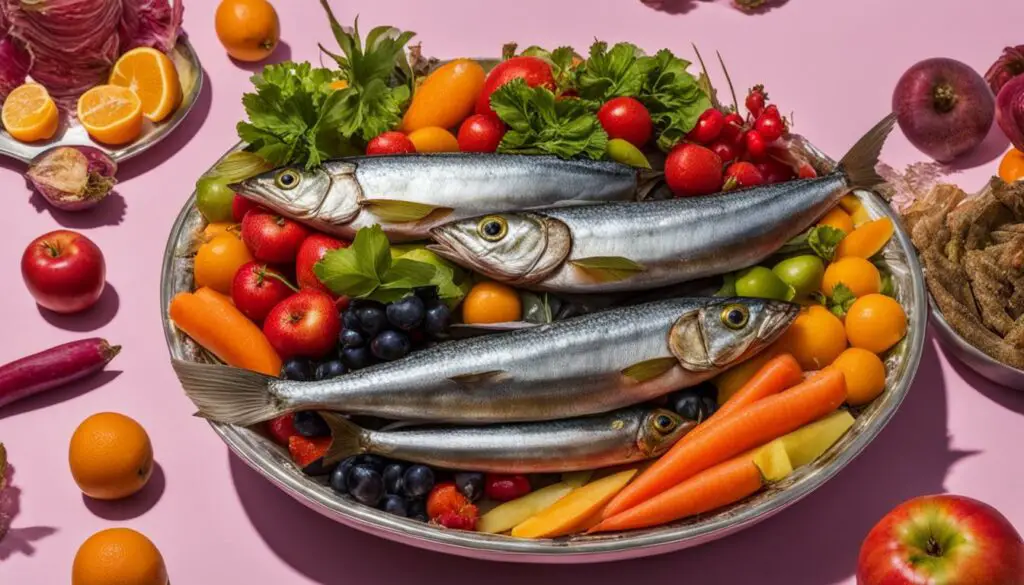
Sardines are not only a delicious treat for humans but also a nutritious addition to your dog’s breakfast. These tiny tinned fish are packed with omega-3 fatty acids, which offer numerous benefits for your dog’s health. Omega-3s are essential for maintaining a healthy coat, supporting brain function, reducing inflammation, and boosting overall heart health.
When choosing sardines for your furry friend, opt for those canned in spring water without added salt. This ensures that you’re providing your dog with the most natural and healthy option. The omega-3 content in sardines can contribute to improved skin and coat condition, reducing itchiness and promoting a lustrous and healthy fur. It also aids in joint health, as omega-3s have anti-inflammatory properties that can alleviate symptoms of arthritis and other joint issues.
Adding sardines to your dog’s breakfast is simple and effortless. You can either mix them directly into their food or offer them whole as a tasty and nutritious snack. Remember to adjust the serving size based on your dog’s weight, age, and dietary needs.
While sardines are an excellent choice, don’t limit yourself to just this type of tinned fish. Other options like salmon, tuna, or mackerel also contain high levels of omega-3 fatty acids and can be included in your dog’s breakfast rotation to provide variety and ensure a well-rounded diet.
Cereals – A Wholesome Option for Breakfast
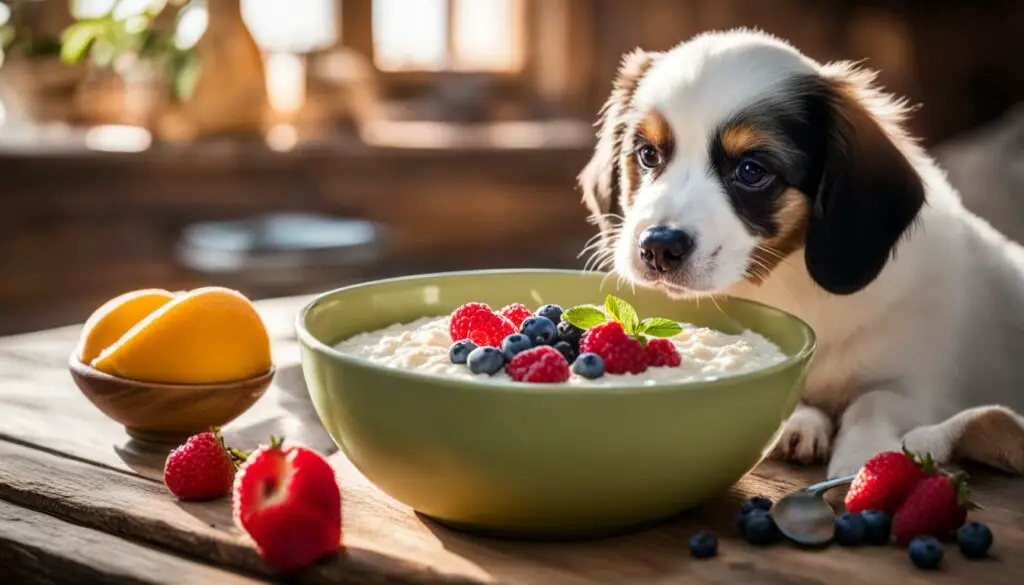
Cereals are a nutritious and satisfying choice for dogs’ breakfast. Among the different types of cereals, rolled oats stand out as a particularly beneficial option. They can be cooked as porridge, offering a better nutritional value compared to processed cereals like corn flakes.
Rolled oats for dogs are a great source of dietary fiber, which aids in digestion and helps regulate bowel movements. They also provide essential nutrients such as vitamins, minerals, and antioxidants, contributing to overall health and well-being.
To enhance the protein content of the breakfast, you can add milk along with cottage cheese or yogurt. These dairy products not only add flavor but also provide additional protein to support muscle development and repair.
For an extra nutritional boost, consider adding some fresh berries to the cereal. Berries are rich in antioxidants, which help protect the body from harmful free radicals and promote a strong immune system.
When preparing cereal for dogs, it’s important to avoid using sweeteners or additives that may be harmful to their health. Stick to natural ingredients and ensure the cereal is cooked to a soft consistency that is easier for dogs to chew and digest.
By incorporating cereals like rolled oats into your dog’s breakfast routine, you can provide them with a wholesome and satisfying meal that supports their overall health and happiness.
Chicken Wings or Necks – Quick and Easy Breakfast Meal
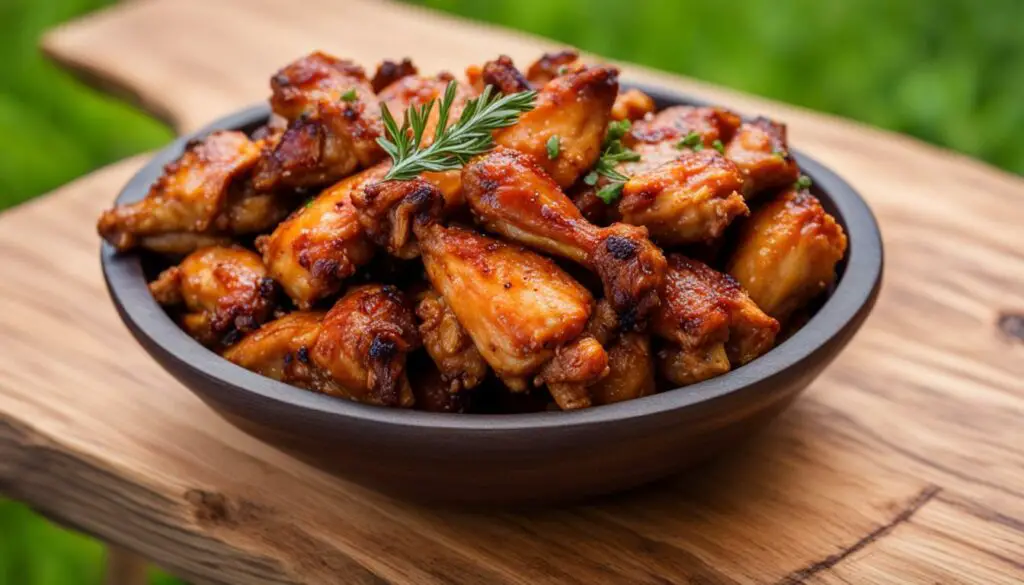
If you have the time, chicken wings or necks can be a quick and easy breakfast option for dogs. These protein-packed treats are not only delicious but also provide several benefits for your furry friend.
Chicken wings for dogs are an excellent source of protein, which helps support their muscle development and overall health. Additionally, the cartilage found in chicken wings provides natural glucosamine and chondroitin, contributing to healthy joints.
Chicken necks for dogs are another great choice for a morning meal. They are rich in essential nutrients like calcium, phosphorus, and vitamins that promote strong bones and teeth. The act of chewing on chicken necks also helps to remove plaque and tartar buildup, maintaining oral health.
When feeding your dog chicken wings or necks, it’s essential to monitor them while they eat bones. Remove any visible fat to prevent gastrointestinal issues. Remember, only feed raw bones to dogs, as cooked bones can splinter and cause harm.
For an added visual, here’s a table outlining the nutritional value of chicken wings and necks for dogs:
| Key Nutrients | Chicken Wings | Chicken Necks |
|---|---|---|
| Protein | High | High |
| Calcium | Low | High |
| Phosphorus | Low | High |
| Vitamins | Vitamin A, B6, B12 | Vitamin A, C, E |
Feeding your dog chicken wings or necks can be a tasty and nutritious way to start their day. Remember, always consult with your veterinarian before making any significant changes to your dog’s diet.
Milk – A Small Bowl of Goodness

A small bowl of milk can be a delightful addition to your dog’s breakfast ritual. For many dogs, dairy products like milk are well-tolerated and provide hydration along with essential nutrients. However, it’s essential to test your dog’s lactose tolerance before incorporating milk into their diet.
Although some dogs can digest lactose without issue, others may be lactose intolerant. If your dog experiences digestive problems such as gas, bloating, or diarrhea after consuming milk, it’s best to avoid dairy products altogether.
Milk contains calcium, vitamins, and minerals that can contribute to your dog’s overall well-being. However, it should only be offered in moderation as a small treat or occasional addition to their breakfast. Too much milk can lead to an upset stomach or weight gain.
If you want to provide a dairy alternative for your lactose-intolerant dog, there are options available, such as lactose-free milk or specialized dog-friendly dairy products. These alternatives can provide similar nutritional benefits without causing any digestive discomfort.
Remember: Always consult with your veterinarian before introducing any new food or dietary changes to your dog’s routine. They can provide tailored advice based on your dog’s specific needs and dietary restrictions.
Sharing Your Healthy Breakfast – A Bonding Experience
When it comes to breakfast, dogs can be a part of the action too! Sharing your own healthy breakfast with your canine companion is not only a great way to bond but also provides them with a nutritious meal. Many dogs enjoy whatever their owners are having, and breakfast is no exception. By including your furry friend in the morning routine, you can create a special moment that strengthens your bond and promotes their well-being.
When sharing breakfast with your dog, it’s important to be mindful of their dietary needs and which foods are safe for them to consume. Not all human foods are suitable for dogs and can even be harmful. For example, while some fruits and vegetables are healthy for dogs, others can be toxic. Chocolate, caffeine, and foods high in salt or sugar should always be avoided.
Choose breakfast options that are healthy for both you and your dog. Here are a few ideas for a healthy breakfast that you can share:
- Eggs: Scrambled eggs or hard-boiled eggs are protein-packed options that many dogs enjoy. Just be sure to cook them without any added seasonings like salt or spices.
- Yogurt: Plain, unsweetened yogurt is a great source of probiotics and can be shared with your dog in small amounts. It’s important to avoid flavored yogurts or those with artificial sweeteners, as these can be harmful to dogs.
- Fruit: Some fruits like blueberries and apples are safe for dogs and can be a tasty addition to your breakfast. Be sure to remove any seeds or pits, as they can be choking hazards.
- Whole-grain toast or oatmeal: If you’re having toast or oatmeal for breakfast, you can offer a small piece or spoonful to your dog. Just make sure it is plain and free from any added sugars or toppings.
Remember to always introduce new foods gradually and in small portions to avoid any digestive upset. Not all dogs have the same dietary needs or tolerances, so it’s essential to consult with your veterinarian if you have any concerns or questions.
Sharing your healthy breakfast with your dog can be a wonderful bonding experience. However, always prioritize their health and safety by making informed choices about the foods you share. By creating a breakfast routine that includes your four-legged friend, you’ll not only strengthen your bond but also provide them with a nutritious start to the day.
Conclusion
In conclusion, breakfast for dogs can be both simple and nutritious. Whether you choose to utilize leftovers, incorporate eggs, add sardines, offer cereals, provide chicken wings or necks, offer milk, or share your own breakfast, there are numerous options to suit your furry friend’s taste buds. However, it’s crucial to ensure that the ingredients used are safe for dogs and align with their individual dietary needs. By maintaining a balanced and varied breakfast routine, you can contribute to your dog’s overall health and well-being.
Remember to prioritize the safety and nutritional value of the ingredients you choose for your furry friend’s morning meal. Offering a well-rounded breakfast will set the tone for a great day ahead and support their long-term health. So, start exploring different options, tailor them to your dog’s preferences, and enjoy the bonding experience that comes with sharing breakfast with your beloved pet.
Final thoughts: Dogs deserve a healthy and fulfilling breakfast just like us. With a little creativity and consideration for their dietary requirements, you can ensure that their breakfast routine is both enjoyable and beneficial. So, whether it’s repurposing leftovers or preparing a specially crafted meal, make breakfast a time to nourish and strengthen the bond you share with your furry companion.
FAQ
What kind of breakfast can I give my dog?
Dogs can have a variety of breakfast options, including leftovers, eggs, sardines, cereals, chicken wings or necks, milk, and even sharing your own healthy breakfast with them.
Can I give my dog leftovers for breakfast?
Yes, leftovers can be a convenient and tasty option for dogs’ breakfast. Just make sure the leftovers are safe and suitable for dogs to consume.
Are eggs a good choice for dogs’ breakfast?
Absolutely! Eggs are a favorite breakfast choice for dogs as they are high in protein. They can be cooked in different ways like scrambled, fried, or hard-boiled.
Can I feed sardines to my dog for breakfast?
Yes, sardines are a healthy source of omega-3 fatty acids for dogs. They can be added to their breakfast for a nutritional boost. Other tinned fish like salmon, tuna, or mackerel can also be used.
Can dogs eat cereals for breakfast?
Yes, dogs can have cereals like rolled oats cooked as porridge for breakfast. This provides better nutrition compared to processed cereals. Adding milk, yogurt, or cottage cheese along with berries can enhance the nutritional value.
Are chicken wings or necks suitable for dogs’ breakfast?
Yes, chicken wings or necks can be a quick and easy breakfast option for dogs. They provide a good source of protein and can help maintain oral health. Monitor them while eating bones and remove visible fat if necessary.
Can I give milk to my dog for breakfast?
A small bowl of milk can be part of dogs’ breakfast. Most dogs tolerate dairy well, but it’s important to test their tolerance with a small amount. If they have any digestive issues, they may be lactose intolerant.
Yes, sharing your own healthy breakfast with your dog is a good way to bond and provide them with a nutritious meal. Just make sure to avoid any potentially harmful ingredients or seasonings.
What is the importance of a balanced and varied breakfast for dogs?
A balanced and varied breakfast helps provide essential nutrients and contributes to your dog’s overall health and well-being. It’s important to consider their individual dietary needs and ensure the ingredients are safe for them.


